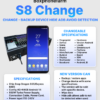In the age of digital transformation, choosing between traditional phone systems and Cloud Phone is not just a matter of technology; it directly impacts operational efficiency, cost, and scalability for businesses. This article will help you understand the differences between the two systems and why Cloud Phone is becoming the inevitable choice for modern organizations.

1. Overview of Cloud Phone and Traditional Phone Systems
Traditional phone systems typically rely on physical infrastructure such as internal PBX systems, landline connections, and individual hardware devices. In contrast, Cloud Phone operates on a cloud-based platform, enabling voice calls and management over the internet without complex physical setups. This means no need for costly hardware, and the system can be set up remotely and accessed from any location with an internet connection.
2. Detailed Comparison: Cloud Phone vs Traditional Systems
| Criteria | Traditional Systems | Cloud Phone |
|---|---|---|
| Infrastructure | Requires physical PBX and wiring | No hardware required, cloud-based |
| Cost | High (hardware, maintenance, setup) | Lower, pay-as-you-go |
| Maintenance | Requires in-house IT or outsourcing | Managed by the provider |
| Scalability | Difficult and costly | Just a few clicks |
| Features | Limited, dependent on hardware | Call recording, call routing, AI, CRM integration, etc. |
| Remote Work | Difficult to implement | Comprehensive support, flexible |
3. Key Advantages of Cloud Phone for Modern Businesses
Cloud Phone brings several advantages that make it a preferred choice for businesses aiming to optimize communication systems while reducing costs. Some key benefits include:
- Cost Savings: Cloud Phone eliminates the need for upfront hardware investments and reduces ongoing maintenance costs. This makes it a highly cost-effective solution for businesses of all sizes.
- Easy Expansion: Cloud Phone systems can be quickly scaled up or down as needed. Businesses can add or remove users with just a few clicks, ensuring flexibility in adapting to changing requirements.
- Multi-platform Integration: Cloud Phone integrates seamlessly with other business tools like CRM systems, customer service software, and team management platforms. This integration helps streamline operations and enhances productivity.
- Efficient Remote Work: One of the most significant advantages of Cloud Phone is its ability to support remote work. Employees can use the system from any location, as long as they have internet access. This is especially beneficial in today’s environment where flexible work arrangements are increasingly common.
- High Data Security: Cloud Phone provides multiple layers of encryption, two-step authentication, and strict access control to ensure the security of business communications and sensitive data.
4. Is Cloud Phone Right for Your Business?
If your business requires flexibility, scalability, cost savings, and remote work capabilities, then Cloud Phone is the ideal solution. It is particularly suitable for:
- Small to medium-sized businesses: Businesses that need a cost-effective, scalable communication solution that doesn’t require a huge upfront investment.
- Startups: New businesses looking for flexibility and affordability as they grow, without the need for complicated infrastructure.
- Enterprises with remote or multiple offices: Businesses that have staff working remotely or across different locations, requiring a unified communication system that can be accessed from anywhere.
5. Tips for Implementing Cloud Phone
When transitioning to Cloud Phone, there are several considerations to ensure smooth implementation and optimal use of the system:
- Choose a reliable service provider: Ensure the provider offers robust support, high uptime, and scalability options.
- Ensure stable internet speed: Cloud Phone relies on a reliable internet connection for high-quality communication, so it is essential to have a strong and consistent connection.
- Train staff on the new system: Employees need to be properly trained to take full advantage of Cloud Phone’s features and functionalities.
- Fully integrate with your business software: Make sure the Cloud Phone system integrates well with your existing CRM, customer service software, and internal communication tools.
Conclusion: The Future of Communication
Cloud Phone is more than just a replacement for traditional systems; it is a revolutionary tool that offers flexibility, efficiency, and modernity for businesses of all sizes. If you are looking for an optimized communication solution that can enhance productivity while cutting costs, Cloud Phone from GenFarmer is the right choice for your business’s digital transformation.











